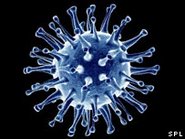Leopards can't change their own spots
I was incredulous when I read this report on the BBC website.
It talks about an experiment undertaken to see how microorganisms are affected by being in space, in micro-gravity. The result was that "the bacteria were almost three times as likely to kill infected mice compared with standard samples held on Earth".
It contains the paragraph:
"These bugs can sense where they are by changes in their environment. The minute they sense a different environment, they change their genetic machinery so they can survive," Professor Nickerson said.
What a complete load of rubbish! Microorganisms don't have brains - they can't think for themselves. And even if they could - do you think they'd know what to do, in order to make themselves better? GAH!
I can't believe that a Professor could speak like this. It's against any true scientist's instincts to come out with this sort of crap - and if she didn't, the BBC have twisted her words and portray her as a daft blonde, or worse, they consider their readers to be thick. Hmmm yes that could be it.
What is much more likely is that the cells less likely to reproduce under micro-gravity conditions are dying without copying, and the ones which move well and reproduce successfully, survive. Thanks to their quick life-cycle the effects of natural selection will become apparent quicker than in other, slower "lifeforms"*. The Hfq master regulator could be important in this process, according to the Arizona University website. Hmm that makes the story much more interesting and informative.
*I'm allowed to use this word because it's a space story.










No comments:
Post a Comment